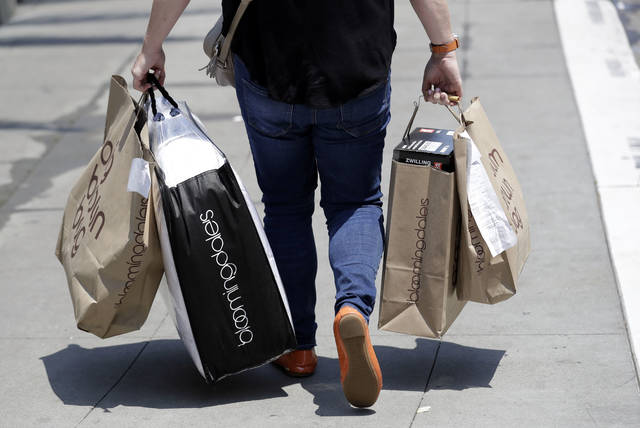WASHINGTON — U.S. retail sales rose at a solid pace last month despite higher prices and modest wage gains, a sign of underlying consumer optimism.
The Commerce Department said Monday that sales at retailers and restaurants increased 0.5 percent in June, following a big 1.3 percent gain the previous month. May’s figure was revised sharply higher from an initial estimate of 0.8 percent.
Americans are confident about the economic outlook, with the unemployment rate near an 18 year-low and the economy accelerating after a sluggish start to the year. Retail sales rose 6.6 percent from a year earlier, the fastest annual pace in five years.
Still, some of the spending increases, such as gas station sales, simply reflect higher prices. Excluding auto dealers and gas stations, sales rose 0.3 percent in June.
Home and garden stores reported a strong 0.8 percent sales gain, which was likely lifted in part by more expensive lumber. The Trump administration imposed tariffs on some lumber imports from Canada last fall.
With consumer spending strong, most economists believe that growth will jump to a 4 percent to 4.5 percent annual rate in the April-June quarter, which would be the strongest in four years. That would follow just 2 percent growth in the first three months of the year.
A survey of business economists found that most companies expect their sales to rise in the coming months and that they plan to raise pay to attract and keep workers. The proportion of businesses planning to raise pay was the largest in roughly 35 years.
Still, most of the respondents to a survey by the National Association for Business Economics said that the Trump administration’s corporate tax cuts last year have yet to affect their plans for hiring and investment. The administration has sold the tax cuts as an incentive for companies to invest more in plant and equipment.
Nearly two-thirds of companies in the NABE survey said that the administration’s trade policies hadn’t changed their hiring or investment plans.
But a quarter of farmers, manufacturers, and construction companies surveyed said they had delayed making new investments because of the tariffs and retaliatory measures by China, Europe and other trading partners.
There are other threats on the horizon. Rising prices for gas, cars, and medical care have boosted inflation in the past year to a six-year high. That has offset modest wage gains, leaving workers with flat pay in the past 12 months after adjusting for price changes.
“Higher inflation … means that consumers likely took on debt and dipped into their savings to support those gains,” Diane Swonk, chief economist at Grant Thornton, said. “We are expecting some moderation in spending over the summer.”
The erosion of purchasing power could worsen if President Trump follows through on a threat to impose tariffs on $200 billion of Chinese imports, including consumer items such as hats, handbags, and furniture. Those duties would follow tariffs on $34 billion of Chinese imports earlier this month, as well as import taxes on steel and aluminum from Europe, Canada, China and other countries.


